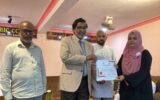Dr. Abdhul Cadher Al Mashoor Mowlana
COLOMBO : The 94th National Day of Saudi Arabia marked a significant milestone in the Kingdom’s history, reflecting its remarkable transformation across various sectors under the visionary leadership of King Salman bin Abdulaziz and Crown Prince Mohammed bin Salman. This day commemorates the unification of the Kingdom by its founder, King Abdulaziz Al Saud, in 1932, and serves as a celebration of national pride, progress, and the unwavering commitment to the future.
Energy Sector: Powering the Kingdom’s Growth
In Sri Lanka, Under the able leadership of Saudi ambassador to Sri Lanka, Khalid bin Hamoud Al-Qahtani, the bilateral relations between Sri Lanka and Saudi Arabia have been further strengthened.
Saudi Arabia has long been a global leader in the energy sector, particularly in oil and gas production. The 94th National Day highlighted the Kingdom’s efforts to expand beyond its traditional oil-based economy by embracing renewable energy sources. Under Crown Prince Mohammed bin Salman’s Vision 2030, the country has made significant investments in solar and wind energy projects, with a focus on sustainability. The launch of the Saudi Green Initiativeand Nem—a futuristic city powered by renewable energy—are key milestones in transforming Saudi Arabia into a clean energy hub.
Industrial Development: Diversification and Innovation
Saudi Arabia has taken bold steps toward industrial diversification, aiming to reduce its dependency on oil. The National Industrial Development and Logistics Program (NIDLP)launched as part of Vision 2030, has accelerated growth in manufacturing, mining, and logistics. The Kingdom’s industrial cities, such as Jubail and Yanbu, have become thriving hubs for petrochemicals and advanced industries. Investments in automotive manufacturing, electronics, and defense industries have contributed to job creation and economic resilience, ensuring that Saudi Arabia is not only a leader in oil but also in advanced manufacturing.
Agriculture: Feeding the Nation with Innovation
Despite its harsh desert environment, Saudi Arabia has made tremendous strides in agricultural development. With a focus on food security, the Kingdom has adopted modern agricultural technologies such as hydroponics, vertical farming, and efficient irrigation systems.
The Saudi Agricultural Development Fund has been instrumental in promoting sustainable farming practices and increasing domestic food production. Through these innovations, Saudi Arabia has managed to overcome its environmental challenges, ensuring a stable and sustainable food supply for its growing population.
Religious Tourism: Expanding the Pilgrimage Experience
Saudi Arabia is the heart of the Muslim world, home to the two holiest sites in Islam: Makkah and Madinah. Religious tourism, particularly the Hajj and Umrah pilgrimages, has always been a cornerstone of the Kingdom’s economy. The 94th National Day was an opportunity to reflect on the vast improvements made in this sector. Massive infrastructure projects, such as the expansion of the Grand Mosque in Makkah and upgrades to transportation networks, have made it easier for millions of pilgrims to perform their religious duties safely and comfortably.
Under Vision 2030, the Kingdom aims to welcome 30 million Umrah pilgrims annually by 2030. The development of new visa systems and digital platforms has also streamlined the process, making it more accessible for pilgrims worldwide.
Crown Prince Mohammed bin Salman’s Role: Visionary Leadership At the heart of Saudi Arabia’s transformation is Crown Prince Mohammed bin Salman, whose Vision 2030 has been the driving force behind the Kingdom’s rapid modernization. His bold and ambitious leadership has paved the way for economic diversification, social reforms, and international engagement. From empowering women to driving forward green energy initiatives, the Crown Prince has ensured that Saudi Arabia remains competitive on the global stage.
Under his leadership, the Kingdom has embraced social reforms that have reshaped the fabric of Saudi society. Women’s participation in the workforce has increased significantly, and new regulations have been implemented to encourage entrepreneurship and innovation. The Vision 2030 agenda continues to attract foreign investments, positioning Saudi Arabia as a regional and global economic powerhouse.
Under the leadership of King Salman and Crown Prince Mohammed bin Salman, Saudi Arabia continues to look toward the future with confidence, determined to achieve the goals outlined in Vision 2030.
As Saudi Arabia celebrates its 94th National Day, the Kingdom stood as a beacon of progress and innovation. From energy and industry to agriculture and religious tourism, the country’s achievements reflect the success of its ambitious development programs.
With a renewed focus on sustainability, economic diversification, and social reform, the Kingdom of Saudi Arabia is well on its way to becoming a global leader across various sectors. The 94th National Day was not only a reflection of past successes but a promise of continued progress and prosperity for the Saudi people.
As part of its Vision 2030 initiative, Saudi Arabia has taken significant steps to establish and grow its automotive industry, moving beyond its traditional reliance on oil. The Kingdom has been focused on diversifying its economy by investing in industries that contribute to long-term economic sustainability. The car industry is one such sector, where Saudi Arabia is making bold investments in manufacturing, technology, and sustainable mobility.
Vision 2030 and Automotive Manufacturing:
One of the core objectives of Vision 2030 is to promote industrial diversification, and the automotive sector plays a key role in this transformation. The National Industrial Development and Logistics Program (NIDLP)aims to position Saudi Arabia as a regional hub for car manufacturing and assembly. The Kingdom’s strategic location, coupled with its well-established infrastructure, makes it an attractive site for both regional and global automotive companies.
The Saudi government has been working closely with international automakers to establish local production facilities. Major players like Lucid Motors an electric vehicle (EV) company, have set up operations in Saudi Arabia. In 2021, the Saudi Public Investment Fund (PIF) invested heavily in Lucid Motors, which plans to build a manufacturing plant in the Kingdom. This factory is expected to produce up to 150,000 electric vehicles annually, making Saudi Arabia a leader in the emerging EV market.
Electric Vehicles: Pioneering Sustainable Mobility
With growing global attention on sustainable energy and climate change, Saudi Arabia has positioned itself as a pioneer in electric vehicle (EV) production. The Kingdom’s focus on renewable energy and sustainable development aligns with the automotive industry’s shift toward electric mobility. The partnership with Lucid Motors reflects Saudi Arabia’s commitment to leading the Middle East in EV production and contributing to global efforts to reduce carbon emissions.
Saudi Arabia Raises 2030 Tourism Target to 150 Million Visitors
Saudi Arabia has increased its 2030 tourism target to 150 million visitors, up from 100 million, after reaching the original goal ahead of schedule. The Kingdom plans to attract 75 million international and 75 million domestic travelers, with $800 billion invested in the sector over the next decade.
Tourism Minister Al-Khateeb highlighted the growing wellness tourism market and stressed the importance of sustainability in development. The Future Investment Initiative in Riyadh brings global leaders together to discuss climate, economy, and technology challenges, focusing on a prosperous future.
$1 Billion Egg Market Expansion…
Saudi Arabia is self-sufficient in the production of eggs. $1 Billion in egg production will be reached by 2025 with production growth annually by 3.95% (CAGR 2023-2028). The surplus of egg production is exported mainly to GCC countries. Opportunities for feeds, poultry houses, health services, processing and packing as well as cold-chain logistics are driving sector expansion.
500% Projected Sector Growth for Aquaculture Products and Services…
With the predicted fish production increase of 500% by 2025, new opportunities to service the aquaculture sector are accelerating. With the increasing export of Saudi fish that will add nearly $1 Billion to the economy, the expansion of fish production requires an increase in aquatic health services, fish farming equipment, packaging and processing systems, and cold-chain logistics services.
















